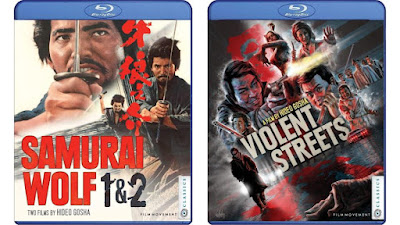To truly appreciate Japanese director Hideo Gosha, who I’d wager many on this side of the pond have never heard of, it’s probably good to be aware of his objective. According to his own daughter, interviewed here on each disc, he didn’t aspire to create high art. Gosha just wanted to crank out profitable, entertaining audience pictures with the resources at his disposal. In that respect, one could compare his output to that of Larry Cohen.
Film Movement has unearthed and restored a few of Gosha’s flicks, which reflect his apparent tendency to follow trends that were big at the time. Hence, one disc collects a couple of samurai films from the 60s, the other is a yakuza gangster epic released during the peak of the genre’s popularity. Like Cohen’s work, they ain’t masterpieces, but as quick & dirty slabs of action cinema, you could do far worse.
 |
| Samurai pedicure. |
SAMURAI WOLF / SAMURAI WOLF II: HELL CUT
1966-1967 / 146 min (2 movies)
Clearly inspired by Kurosawa’s Yojimbo and Sanjuro, these two films feature Kiba (Isao Natsuyagi), a wandering ronin who stumbles into situations where his swordsmanship comes in handy. In Samurai Wolf, he comes to the aid of a beautiful (and blind) relay post owner being threatened by bandits and a corrupt shogun. Samurai Wolf II: Hell Cut sees him escorting another wayward ronin to stand trial for murder. However, those who originally hired the man want him dead.
While Gosha is no Kurosawa, both films are fast-paced and entertaining, with good stories, plenty of violent action and interesting secondary characters. As Kibo, Natsuyagi is engaging and likable, even somewhat vulnerable in the second film. Overall, what Gosha lacks in a budget is compensated by his obvious fondness for this character (and no small amount of exuberance).
EXTRA KIBBLES
“OUTLAW DIRECTOR: HIDEO GOSHA” - An insightful interview with Gosha’s daughter, Tomoe.
AUDIO COMMENTARY - By author Chris Poggiali.
SUPPLEMENTAL BOOKLET - Includes a new essay by Gosha biographer Robin Gatto.
 |
| "I told them no anchovies." |
VIOLENT STREETS
1974 / 96 min
Perhaps adding a bit to its authenticity (or at the very least, its publicity), Violent Streets stars Noboru Ando, who was a real-life yakuza before becoming an actor. He displays a strong screen presence as Egawa, a retired gangster who was given a nightclub by his former yakuza family for his years of loyalty. However, now they want it back, since it apparently gives them a foothold in the territory of a rival family. Following a kidnapping gone-wrong - instigated to spark a war between the two gangs, Egawa finds himself forced to square off against his former bosses.
Aptly named, Violent Streets won’t win any awards for subtlety. Brash, ballsy and brutal, the complex plot is punctuated by ample amounts of knife fights, gunplay, murder and prolonged sex scenes. While definitely on the exploitative side - especially its overall depiction of women - the film is very well made for what it is. Though the narrative is sometimes a little too complicated for its own good, Violent Streets encompasses everything that makes the yakuza genre such disreputable fun.
EXTRA KIBBLES
“TATTOOED DIRECTOR: HIDEO GOSHA” - Another excellent interview with Gosha’s daughter, Tomoe.
“A STREET THAT CAN’T BE BEAT” - Video essay by author Patrick Macias.
SUPPLEMENTAL BOOKLET - Includes a new essay by author/historian Mark Schilling.
Available separately, both discs include informative, affectionate bonus features that showcase the director’s career, and the movies themselves have been nicely restored for Blu-ray. Hideo Gosha may not be mentioned among Japan’s legendary filmmakers, but as Samurai Wolf and Violent Streets demonstrate, he certainly knew how to crank out a good potboiler.


.png)
No comments:
Post a Comment